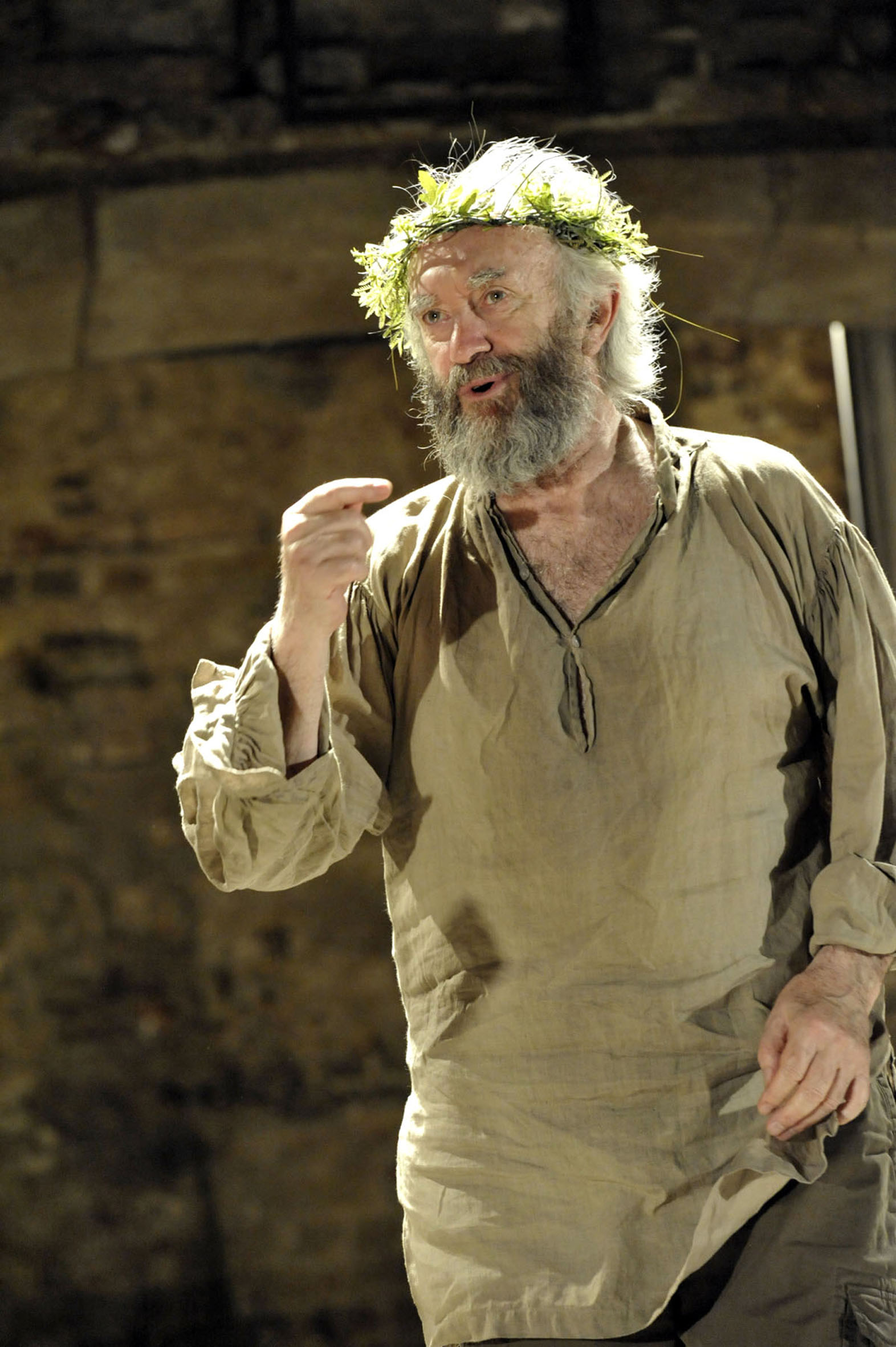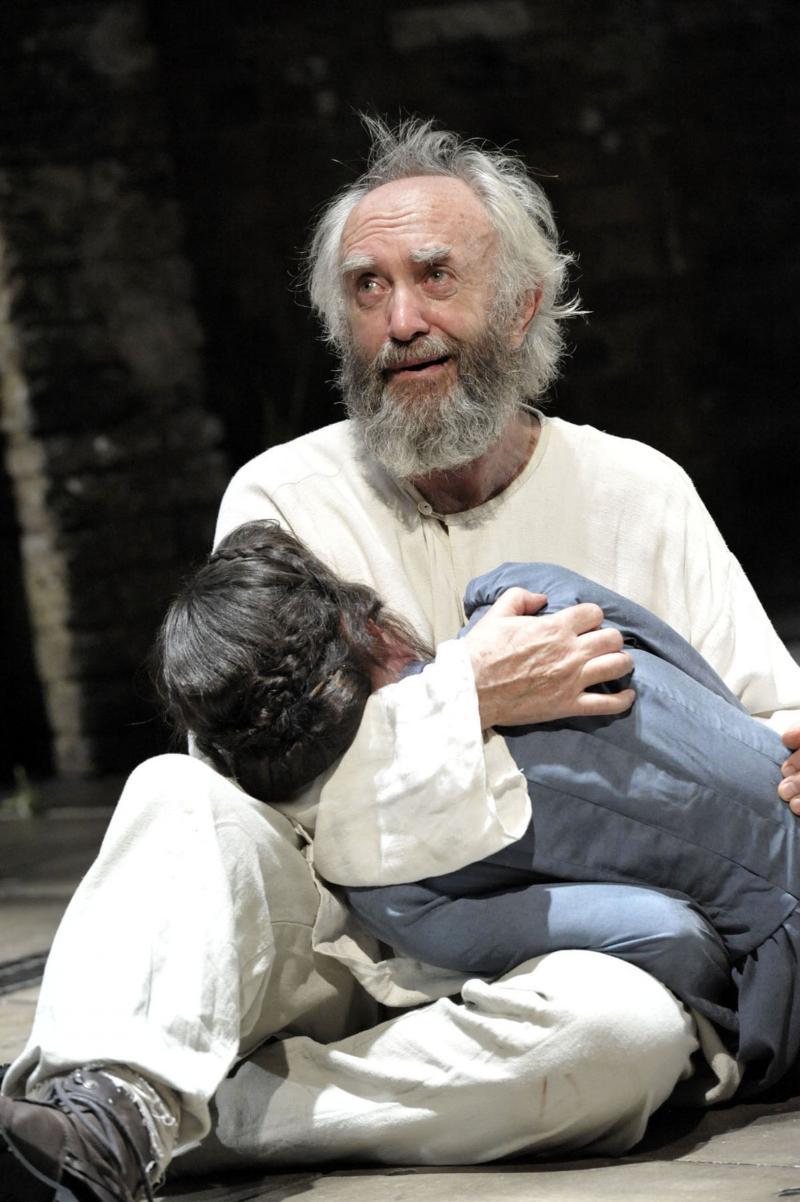He arrives in a blaze of light and trumpets, but Jonathan Pryce’s King Lear seems as much charming, lovable father as imposing monarch as he sets about carving up his kingdom. What follows, though, brings a prickling sense of horror, as Michael Attenborough’s production lends a disturbing dimension to Shakespeare’s bleak tragedy. This is an account of an emotional despotism that has led to a hideous distortion of relationships; and Lear’s demand for absolute loyalty and devotion – his need to quantify love, and to receive proof of it – has damaged his elder daughters so profoundly that it costs them their humanity, and him his wits. It’s an interpretation that tests our sympathy, and yet Pryce handles it magnificently. He is perverse, abusive, devastatingly cruel; yet he is also tender, needy, foolishly funny and fatally confused.
White-haired and bearded, twinkly, but with the bearing of a once-fearsome monarch, Pryce bestows chunks of his kingdom, each accompanied by a coronet, as if he’s handing out Christmas gifts. By the time he reaches Phoebe Fox’s fine Cordelia, he’s enjoying his own generosity so much that he places the coronet on her head without waiting to hear her avowals of affection for him. When she refuses to gush, he is horribly wounded - and his blurted “I loved her most!” makes her sisters, Goneril and Regan, wince.
 But if their later callous treatment of him seems grotesque, Attenborough throws in a deeply discomfiting suggestion as to its origins. Pryce delivers his curse on Zoe Waites’ Goneril with breathtaking venom; but, worse, snarling the lines “Thou shalt find/That I’ll resume the shape which thou dost think/I have cast off for ever”, he corners her and forces upon her mouth a violent and heavily sexual kiss. Later, he subjects Jenny Jules as Regan to a similarly incestuous embrace. Is this a symptom of his unravelling mind – or could he have abused his two daughters, sparing the baby of the family, his beloved Cordelia? That awful possibility hangs over the action like a toxic pall.
But if their later callous treatment of him seems grotesque, Attenborough throws in a deeply discomfiting suggestion as to its origins. Pryce delivers his curse on Zoe Waites’ Goneril with breathtaking venom; but, worse, snarling the lines “Thou shalt find/That I’ll resume the shape which thou dost think/I have cast off for ever”, he corners her and forces upon her mouth a violent and heavily sexual kiss. Later, he subjects Jenny Jules as Regan to a similarly incestuous embrace. Is this a symptom of his unravelling mind – or could he have abused his two daughters, sparing the baby of the family, his beloved Cordelia? That awful possibility hangs over the action like a toxic pall.
Tom Scutt’s designs give the action a setting that is vaguely medieval, yet recognisably modern. Industrial steel gates lead on to a castle courtyard; the costumes blend drapery in tapestry colours with fatigues and Barbour-style quilting – part courtly, part military, part country gentry.
The delivery of the text, too, has a fluidity, pace and rhythm that feels very contemporary. And the relationships are layered and played with vibrancy. Kieran Bew’s wily Northern Edmund presents a stark contrast to his half-brother Edgar, plummily played by Richard Goulding. From making his first appearance in an erotic clinch with a semi-clad servant, Goulding makes Edgar’s transition to the hunted Poor Tom and finally to maturity quietly compelling. The scene in which he leads his blinded father, Clive Wood’s Gloucester, to the edge of a imaginary Dover cliff is almost unbearably moving – though the notorious eye-gouging itself, while staged highly effectively, is stymied somewhat by Chook Sibtain’s wooden Cornwall. Trevor Fox as a lanky Geordie Fool is both genuinely funny and full of compassion, and Ian Gelder's stoic, good-hearted Kent also makes his mark. As for Fox’s Cordelia, she’s every inch her father’s daughter, imperiously furious at his childish tantrum in the opening scene, dignified, unyielding, almost Joan of Arc-like in her armour at the climax.
And Pryce, at the centre of the storm, is tremendous: a man who has undone himself, a ruler who has lost his grip, and a father who, in destroying his own family, has created his own desolation. It is in that realisation that madness lies; and it is an eviscerating image of dysfunction that has an insistent immediacy.
10 GREAT KING LEARS
Greg Hicks, RSC. Hicks occupies the part with brisk and inventive intensity.
Derek Jacobi, Donmar Warehouse. A thrilling chamber version, though even at 72 Jacobi still seems too spry
Glenda Jackson, Old Vic. Jackson returns to the stage as an authoritative Lear, gender irrelevant
Grigori Kozintsev, 1971 Russian film version. Truly apocalyptic masterpiece, stunningly performed
Tatsuya Nakadai, Kurosawa's Ran. Lear-inspired epic of the futility of war
Simon Russell Beale, National Theatre. Russell Beale's Lear budges up to make room for Mendes's vision
Barrie Rutter, Northern Broadsides. Jonathan Miller's vivid production puts Lear in a Yorkshire accent
Antony Sher, RSC. Sher runs the full delivery gamut in Gregory Doran's distinguished production
John Shrapnel, Tobacco Factory. A traditional Lear triumphs in the heat of Bristol's alchemical vessel
Aleh Sidorchik, Shakespeare's Globe. Belarus Free Theatre stages Lear as post-Soviet Oedipal X-Factor extravaganza















Add comment